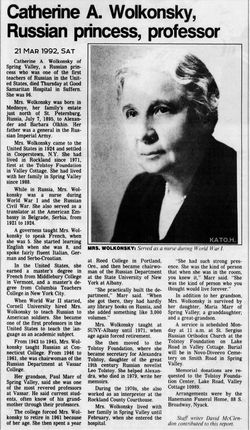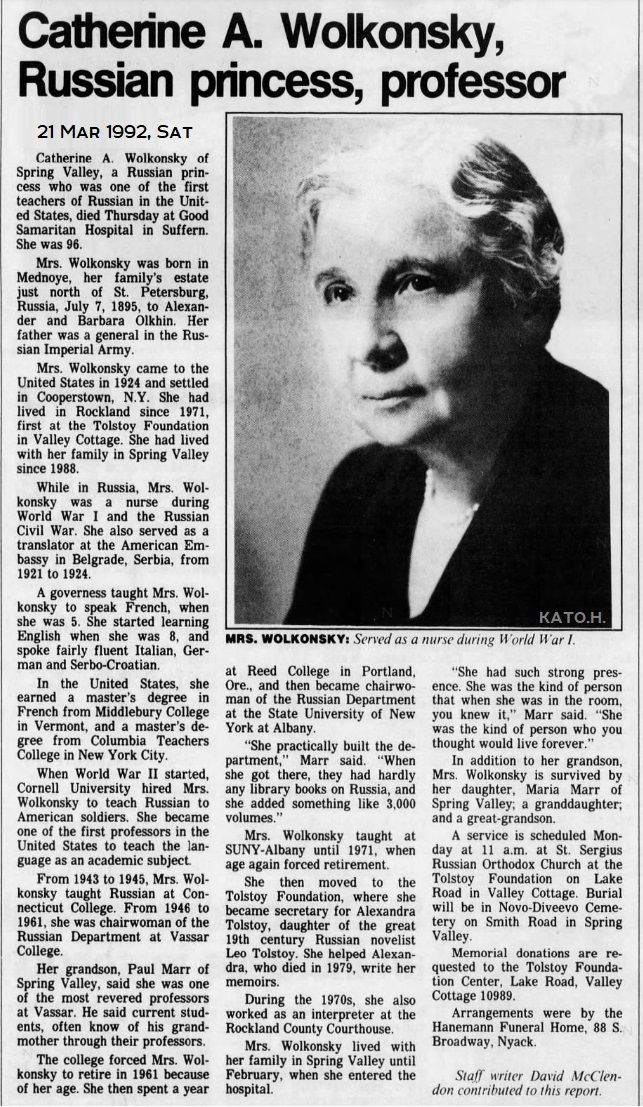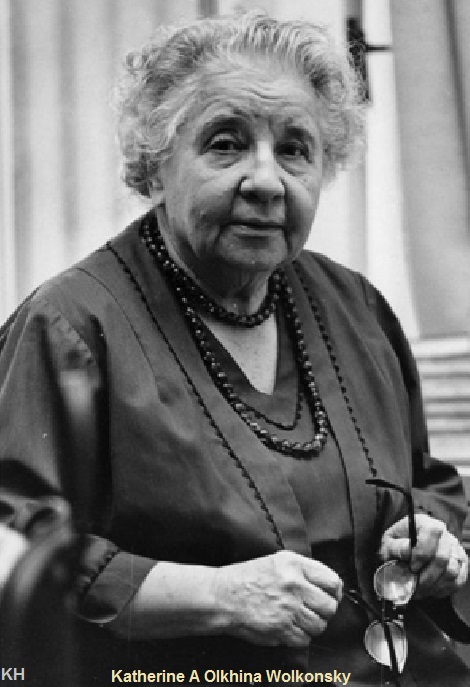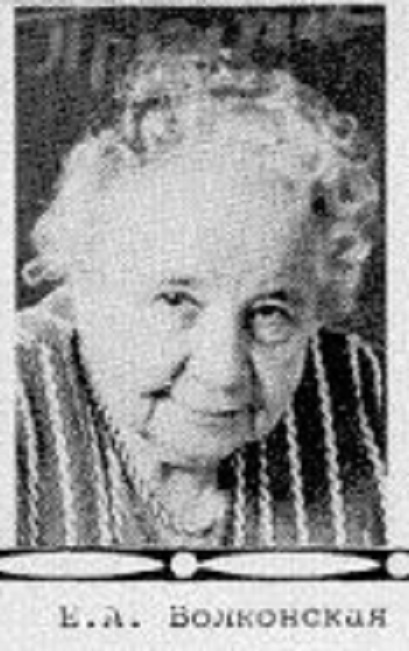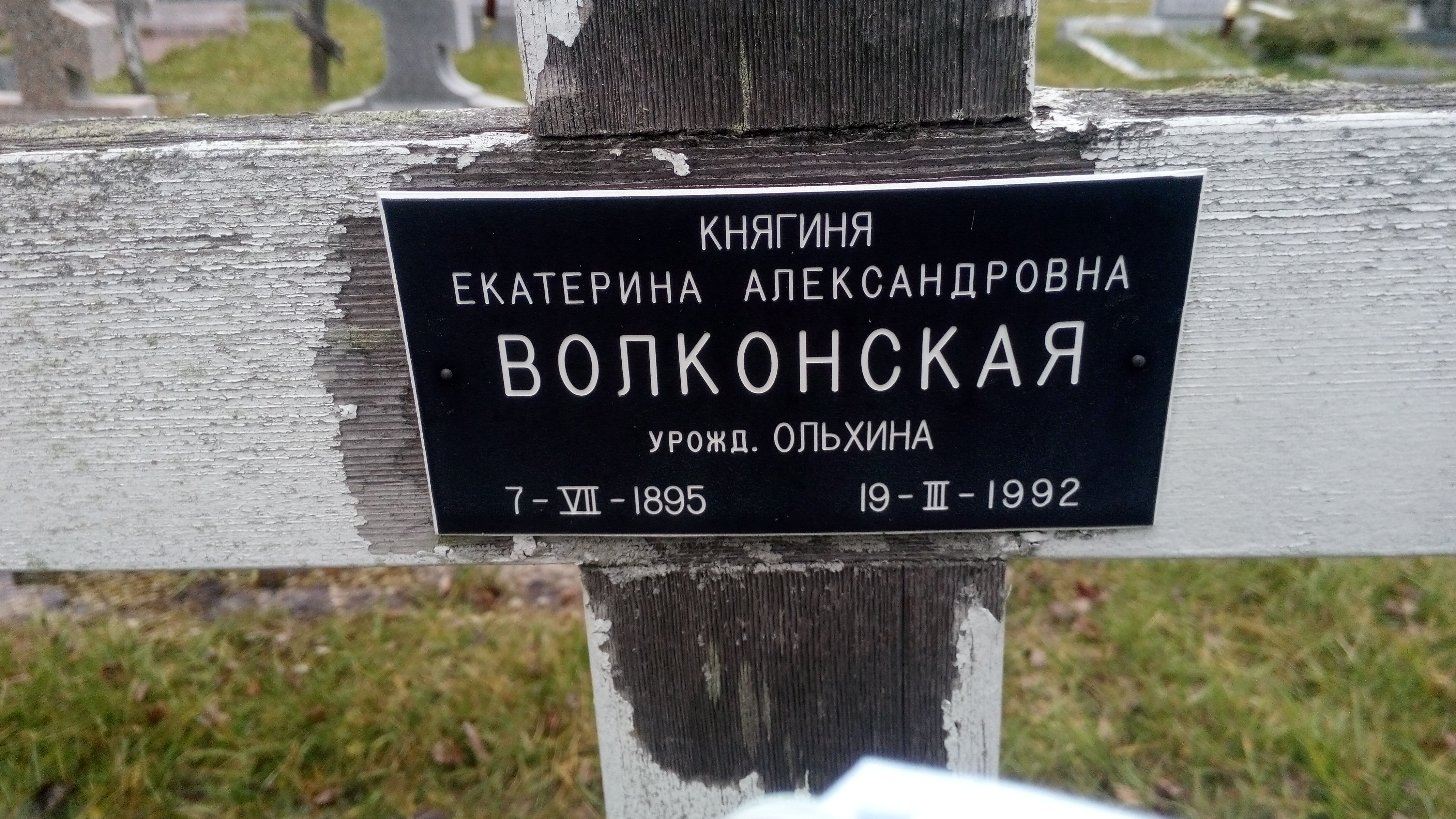Ekaterina A Olkhina Volkonsky - Katherine Wolkonsky
For fifteen years (1946-1961) Catherine Wolkonsky presided over the Russian Department at Vassar. The large Tolstoy and Dostoevsky courses in English were institutions (always taught at 8 a.m.!) . The lectures were enlivened by personal reminiscences and biographical details of her subjects. Her
expertise as a language teacher had developed for many years before arriving at Vassar. And she certainly never knew what "retirement" meant. Born in St. Petersburg, Russia, to a military landowning family, Catherine Olkhina served as an army nurse through the World War and the Civil War, retreating with the White Army to Istanbul, Belgrade, and eventually joining distant relations in Cooperstown, New York, in 1924. Here she taught French until World War 11, when Cornell inaugurated training of army officers in the Russian language. She was the only woman on the Cornell faculty. She came to Vassar in 1946, after the sudden death of Nicolas Strelsky, founder of Vassar's Russian department. I remember the large first-year class that year, with seven distinguished faculty members as regular attendants. Soon word reached her that the dean, Mildred Thompson, had decided to take Russian. A colleague jokingly asked her if she would survive it. She responded, "I survived a revolution and typhus in a freight car. I think I can survive the dean!" There were many stories about her years at Vassar. Billie Davis Gaines 'SB, now head of AAVC, wrote that she learned from her what fun it could be to teach Russian. One technique Mrs. Wolkonsky stressed was the root approach to vocabulary acquisition; it culminated in the Handbook of Russian Roots, coauthored with Marianna Poltoratzkaya and published by Columbia University Press in 1961. In 1963 Mrs. Wolkonsky was invited to start a Russian department at the newly instituted State University at Albany. She also started the Russian collection of the library there and remained to institute a graduate department of Slavic languages, retiring in 1972 at the age of 77. (After that retirement party she reported: "Seven bottles of vodka and nobody drunk!") She then moved to the Tolstoy Foundation Center at Valley Cottage, NY, where she assisted her old friend Alexandra Tolstoy, daughter of the writer, with her memoirs (Out of the Past, coedited with Katherine Strelsky, 1981). She taught at Middlebury College Russian School for thirteen summers, starting in 1955. Mrs. Wolkonsky also taught at the University of Connecticut at Storrs, Bennett Junior College, and Reed College in Oregon, as well as a course on the methods of teaching Russian at Teachers College, Columbia University (1956-58). In 1958 she helped colleagues start the summer program at Wmdham College, which developed into the Russian School at Norwich University. Here she taught until her ninetieth birthday in 1985. Norwich honored her forty-five years of teaching in 1969 with a Doctorate of Humane Letters, honoris causa. In 1972 she received the New York State award for Distinguished Foreign Language Teacher.
At Vassar she was one of those who exemplified the art of teaching. Lacking formal preparation and degrees, she was proud of her heritage and was constantly trying to improve her knowledge in her field. She touched us by weaving her personal experiences in with her irreverent observations and criticisms of the academic field, making her classes alive. She was deeply interested in her students and in turn engaged their interest, establishing a warm, and encouraging relationship. Her enthusiasm overcame even the most skeptical student and the most illogical "caprices of the language," a favorite expression. Her vigorous, attractive personality and sense of humor boosted the student over the difficulties. The material was easily mastered. To Yekaterina Alexandrovna, from your Vassar students, your colleagues, and your friends here, a fond farewell. Lydia Weston Kesich '5O Vassar faculty, 1955-58 Bronxville, New York
Handbook of Russian Roots (Columbia Slavic Studies)
ISBN-13: 978-0231021173
ISBN-10: 0231021178
2F%2Fwww.albany.edu%2Fllc%2Fnewsletters%2Fllcnewsletter_Sp
Sum09.pdf&psig=AFQjCNGXCi-oL5XfbdU8OrxwtwGLtz8ITA&ust=1464470823144965
ob;
Parents: Alexander and Barbara Olkhina
From her 1930 Census:
Age at First Marriage 25 [1920]
Immigration Year 1923
Divorced by 1940 census; note: husband remarried in 1933
Ekaterina A Olkhina Volkonsky - Katherine Wolkonsky
For fifteen years (1946-1961) Catherine Wolkonsky presided over the Russian Department at Vassar. The large Tolstoy and Dostoevsky courses in English were institutions (always taught at 8 a.m.!) . The lectures were enlivened by personal reminiscences and biographical details of her subjects. Her
expertise as a language teacher had developed for many years before arriving at Vassar. And she certainly never knew what "retirement" meant. Born in St. Petersburg, Russia, to a military landowning family, Catherine Olkhina served as an army nurse through the World War and the Civil War, retreating with the White Army to Istanbul, Belgrade, and eventually joining distant relations in Cooperstown, New York, in 1924. Here she taught French until World War 11, when Cornell inaugurated training of army officers in the Russian language. She was the only woman on the Cornell faculty. She came to Vassar in 1946, after the sudden death of Nicolas Strelsky, founder of Vassar's Russian department. I remember the large first-year class that year, with seven distinguished faculty members as regular attendants. Soon word reached her that the dean, Mildred Thompson, had decided to take Russian. A colleague jokingly asked her if she would survive it. She responded, "I survived a revolution and typhus in a freight car. I think I can survive the dean!" There were many stories about her years at Vassar. Billie Davis Gaines 'SB, now head of AAVC, wrote that she learned from her what fun it could be to teach Russian. One technique Mrs. Wolkonsky stressed was the root approach to vocabulary acquisition; it culminated in the Handbook of Russian Roots, coauthored with Marianna Poltoratzkaya and published by Columbia University Press in 1961. In 1963 Mrs. Wolkonsky was invited to start a Russian department at the newly instituted State University at Albany. She also started the Russian collection of the library there and remained to institute a graduate department of Slavic languages, retiring in 1972 at the age of 77. (After that retirement party she reported: "Seven bottles of vodka and nobody drunk!") She then moved to the Tolstoy Foundation Center at Valley Cottage, NY, where she assisted her old friend Alexandra Tolstoy, daughter of the writer, with her memoirs (Out of the Past, coedited with Katherine Strelsky, 1981). She taught at Middlebury College Russian School for thirteen summers, starting in 1955. Mrs. Wolkonsky also taught at the University of Connecticut at Storrs, Bennett Junior College, and Reed College in Oregon, as well as a course on the methods of teaching Russian at Teachers College, Columbia University (1956-58). In 1958 she helped colleagues start the summer program at Wmdham College, which developed into the Russian School at Norwich University. Here she taught until her ninetieth birthday in 1985. Norwich honored her forty-five years of teaching in 1969 with a Doctorate of Humane Letters, honoris causa. In 1972 she received the New York State award for Distinguished Foreign Language Teacher.
At Vassar she was one of those who exemplified the art of teaching. Lacking formal preparation and degrees, she was proud of her heritage and was constantly trying to improve her knowledge in her field. She touched us by weaving her personal experiences in with her irreverent observations and criticisms of the academic field, making her classes alive. She was deeply interested in her students and in turn engaged their interest, establishing a warm, and encouraging relationship. Her enthusiasm overcame even the most skeptical student and the most illogical "caprices of the language," a favorite expression. Her vigorous, attractive personality and sense of humor boosted the student over the difficulties. The material was easily mastered. To Yekaterina Alexandrovna, from your Vassar students, your colleagues, and your friends here, a fond farewell. Lydia Weston Kesich '5O Vassar faculty, 1955-58 Bronxville, New York
Handbook of Russian Roots (Columbia Slavic Studies)
ISBN-13: 978-0231021173
ISBN-10: 0231021178
2F%2Fwww.albany.edu%2Fllc%2Fnewsletters%2Fllcnewsletter_Sp
Sum09.pdf&psig=AFQjCNGXCi-oL5XfbdU8OrxwtwGLtz8ITA&ust=1464470823144965
ob;
Parents: Alexander and Barbara Olkhina
From her 1930 Census:
Age at First Marriage 25 [1920]
Immigration Year 1923
Divorced by 1940 census; note: husband remarried in 1933
Family Members
Sponsored by Ancestry
Advertisement
Advertisement
